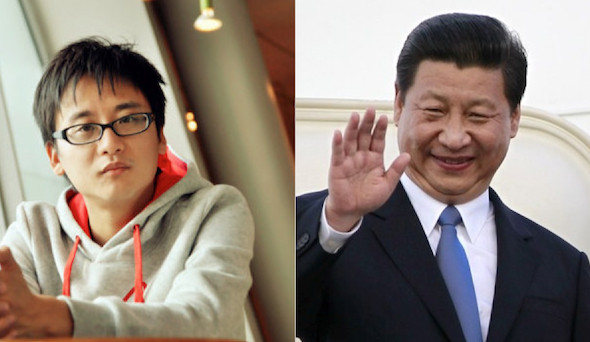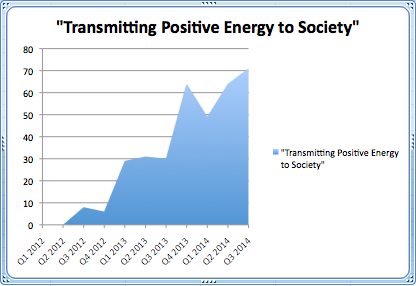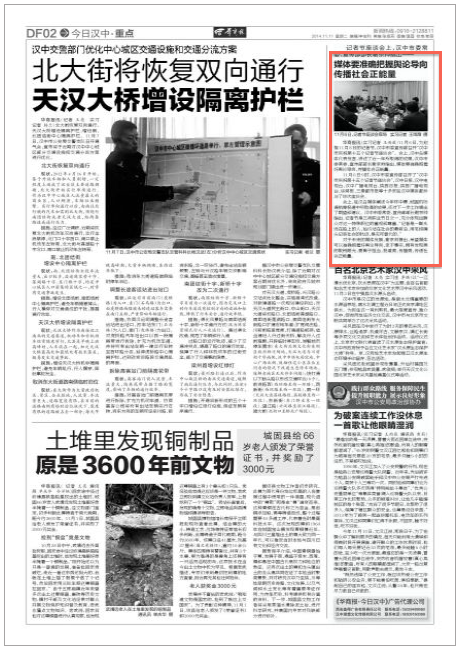What do you get when you combine a mainland tour by a Taiwanese pop icon with a roomful of propaganda officials who want to put their own stamp on policy? You get, possibly, a catchy new buzzword for state controls on the news, arts and culture.
As we saw last month at the Chinese Communist Party’s forum on arts and culture, President Xi Jinping is all about “positive energy” in media and culture. He told artists gathered at the event that works of art and literature “should be like sunshine, blue sky and the spring breeze, inspiring minds, warming hearts and cultivating taste.” Cultural creation, said Xi, should brim with “positive energy,” or zhengnengliang (正能量), which refers to positive and uplifting content and attitudes as opposed to critical and negative ones.

In the context of news control, “positive energy” is akin to another term favored under Jiang Zemin and Hu Jintao, “emphasising positive news.”
While the full phrase, “transmitting positive energy to society” (传播社会正能量), is a relative newcomer to China’s information/culture control lexicon, its rise is unmistakable.
The following is a search of the full “positive energy” phrase in the WiseNews database, accounting for hundreds of Chinese newspapers. (“Positive energy,” or zhengnengliang (正能量), cannot be searched separately because it can be used very differently in other contexts.)

The upward trend of the term since the final months of 2012 and the start of the Xi Jinping administration suggests it is an important — if not yet definitively core — concept in news and propaganda work.
When we look at how local propaganda leaders are deploying their control discourse of late, we can see that the phrase is a crucial one. When, for example, the propaganda chief of the city of Hanzhong, in Shaanxi province, addressed a forum on November 6 to commemorate China’s official Journalist’s Day, he set “positive energy” right beside China’s reigning cardinal control term, “public opinion guidance“:
At the forum, speeches were given by representatives from various media in Hanzhong, talking about the results achieved over the past year. Hanzhong Party Committee Member and Propaganda Minister Xie Jingshuai (谢京帅) pointed out that media must have a correct grasp of public opinion guidance (准确把握好舆论导向), and transmit positive energy to society (传播社会正能量).
. . . .
Concerning future media development, Xie Jingshuai said he hoped that media could correctly grasp public opinion guidance, respect the facts, have a keen eye for discovering beautiful things (拥有发现美的敏锐眼光), have the courage to bear [their responsibilities], that they report beauty, spread beauty and transmit positive energy to society (报道美、传播美,传递社会正能量).

Where did this idea of “transmitting positive energy to society” originate?
The official use of the term seems to go back to September 2012, when just 8 articles in the universe of mainland Chinese newspapers mentioned the term.
A September 4, 2012, article in Beijing Business Today (北京商报), carried on many internet news portals in China, bore the headline, “State Administration of Radio Film & Television: We Encourage the Making of TV Dramas with Positive Energy.”
This report was about a discussion forum in Beijing called “There is a Spirit Called the Beijing Spirit” that dealt with a TV drama called Beijing Youth (北京青年). At that event, Wang Danyan (王丹彦), deputy section head of the Propaganda Management Division of SARFT (now merged with the General Administration of Press and Publications), “gave her thumbs up to Beijing Youth and TV dramas like it that transmit positive energy to society.”
Interestingly, the only coverage using the term “transmitting positive energy to society” in the three years prior to the SARFT remarks on Beijing Youth can be found in three articles in July 2011 reporting on concerts in China by Taiwanese superstar Lo Ta-yu (罗大佑):
You can easily see Lo Ta-yu’s desire to use the concerts to transmit positive energy to society, and this is why he is still called ‘the godfather of Chinese pop.’
In the decade prior to that coverage, there is nothing anywhere in mainland news coverage about “transmitting positive energy to society.”
Lo is a widely recognised cultural icon in Taiwan, mainland China and Hong Kong — though his simple and melodic songs have sometimes contained social and political commentary, and in the 1980s there were bans on some of his songs in Taiwan and the PRC. [There is an interesting piece here, with English translation, about a Lo tune called “Orphan of Asia.”]
More recently, Lo sparked some controversy during Taiwan’s “Sunflower Movement” protests earlier this year, when he called student protesters “victims of mass hysteria.”
Was Lo Ta-yu’s 2011 mainland concert tour the inspiration for the emerging propaganda notion of “transmitting positive energy to society”? It’s difficult to say for sure. But it is certainly possible. After all, as propaganda officials know only too well, culture moves in mysterious ways.




















